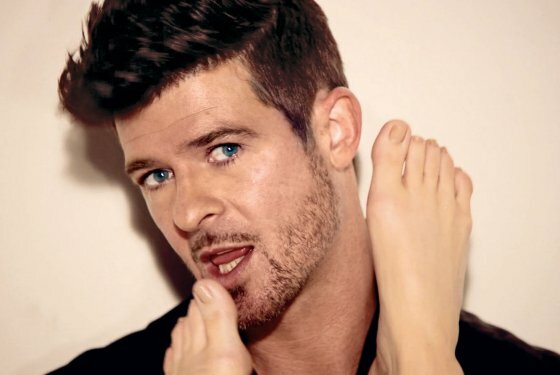
{Image via}
After its tenth week on the Billboard’s Hot 100, it’s needless to say that Robin Thicke’s is the song of the summer. However, its time in the headlines has raised speculation about its similarity to Marvin Gaye’s 1977 “Got to Give it Up.” So, on August 15, Thicke and the track’s co-producers, Pharell Williams and Clifford Harris, filed a preemptive lawsuit against the Gaye Family and Bridgeport Music in pursuit of a court decision proving that their song does not infringe on any copyrights.
The Hollywood Reporter, who broke the story last Thursday morning, that the “Gaye family is alleging that ‘Blurred Lines’ and Gaye’s ‘Got to Give It Up’ ‘feel’ or ‘sound’ the same.” The document suggests that the family is “claiming ownership of an entire genre, as opposed to a specific work.”
Marvin Gaye, hero of Motown music, released “Got to Give it Up” on March 15, 1977. The funk number reached the top of the Billboard Hot 100 for one week in June of the same year. It’s a sexy funk number with a distinctive beat.

{Image via}
The two tracks open with similar percussion and a get-off-your-seat tempo. When listening to “Got to Give it Up,” the “Hey, Hey, Hey’s” of Thicke’s track seem as if they could fit right in, and the content and sentiment of the tracks are similarly erotic. It’s not completely off base to think that Robin Thicke may have been jamming to some Marvin Gaye right before he sat down to pen his naughty hit.
So, is music reminiscent of other music a copyright infringement – or is it inspiration? That all depends on the parties involved.
In 2011, Lady Gaga released “Born This Way” to heavy critiques about its musical similarity to Madonna’s “Express Yourself.” The Material Girl didn’t make a stink, and Gaga didn’t file any protective lawsuits. Instead, as reported by Huffington Post, Madonna slipped seamlessly into a cover of “Born This Way” while singing her own “Express Yourself” and let the media deal with the rest.
With no report of any seamless flowing between the two tracks, similarity continues to rest on interpretation. We’ll have to continue to track the settlement between the two parties because, right now, the lines remain blurred.
By




Kristen
What issue is more important: a lawsuit between multi-millionaire singers or the blatant misogynistic theme of Thicke’s ultra popular song?